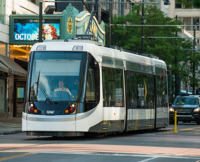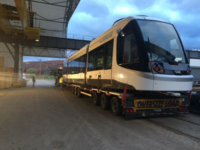KC breaks through with Streetcar, Smart City – Huffington Post
Kiosks installed at streetcar stops and throughout downtown allow travelers to check the arrival of the next trolley, and display curated content about the city’s restaurants, concerts and sports games.
Residents will also benefit from a public wifi network covering nearly 3 square miles of downtown that, along with the lights and kiosks, are part of an infrastructure overhaul in Kansas City that will reduce energy costs, improve traffic safety and increase access to public services and events.
“We see connectivity as a new utility,” Bob Bennett, the city’s chief innovation officer, told The Huffington Post. “You can’t get a job without getting on the Internet, and you can’t figure out where you need to go without connectivity. Cities have to evolve.”
Even parking woes would be made easier by the new technology. The city plans to eventually use the sensors along the streetcar line to develop a mobile app that allows drivers to see when parking spaces become available. And the sensors could help streamline wastewater and stormwater runoff management.
The interactive kiosks may soon turn into small social hubs for locals, and it’s not uncommon to hear people use the booths as a meeting point, Bennett said.
“It’s gotten people’s noses out of their phones and looking at each other while using 7-foot-tall representations of what they have in their pocket,” Bennett added.
The kiosks can be synced to smartphones with a mobile app. That way, for example, users who see an ad for a lunch special at a local cafe can pull up that information on their own device when they get hungry later in the day. In a boost to local businesses, shop and restaurant owners can elect to push out ads on the kiosks based on what a user is searching. (Sessions are wiped to protect users’ data.)
“Innovation is coming from everywhere,” said Tom Touchet, CEO of Smart City Media, which manages the kiosks. “It’s not just a big city game.”
City-wide wifi networks have become increasingly common as local governments scramble to address issues of inequality and access to services. President Barack Obama has called high-speed Internet a “necessity” and said increased access is crucial to a competitive economy. In New York City, thousands of rusty pay phones will be converted into wifi hot spots and charging stations for mobile devices.
As these smart cities proliferate, the private sector has rushed to partner with municipal governments. IBM, Philips and Cisco, which is helping Kansas City upgrade and manage its digital infrastructure, have worked with hundreds of cities internationally to pilot new technology.
In Barcelona, parks have added irrigation systems that turn on sprinklers when plants need to be watered, and smart trash cans notify workers when they are full.Copenhagen installed bike path lights to warn cyclists approaching red traffic lights, and aims to become the first carbon-neutral capital by 2025.
“Data is the asset now,” said Kim Majerus, a vice president at Cisco who oversaw the Kansas City project. “Now the question is, how do cities use it to do things more effectively and provide solutions to their citizens.”
Alphabet, the parent company of Google, is eyeing smart cities of its own. It plans to partner with disadvantaged regions and outfit them with new technology, in addition to using them to showcase its self-driving cars, the Wall Street Journal reported.
Three connected vehicle pilots, funded by the Department of Transportation, are currently underway to improve pedestrian safety and reduce congestion. The agency is also granting $40 million for its smart city challenge, which seeks to integrate autonomous cars and smart technology into a city’s transportation network. (Kansas City is a finalist.)
“Over time the most powerful technology becomes invisible. It’s about lowering costs and modernizing cities,” said Herb Sih, a co-founder of the Kansas City-based incubator Think Big Partners, which advised the city on its new project. “There’s an opportunity in Kansas City to solve problems and improve the quality of life.”



